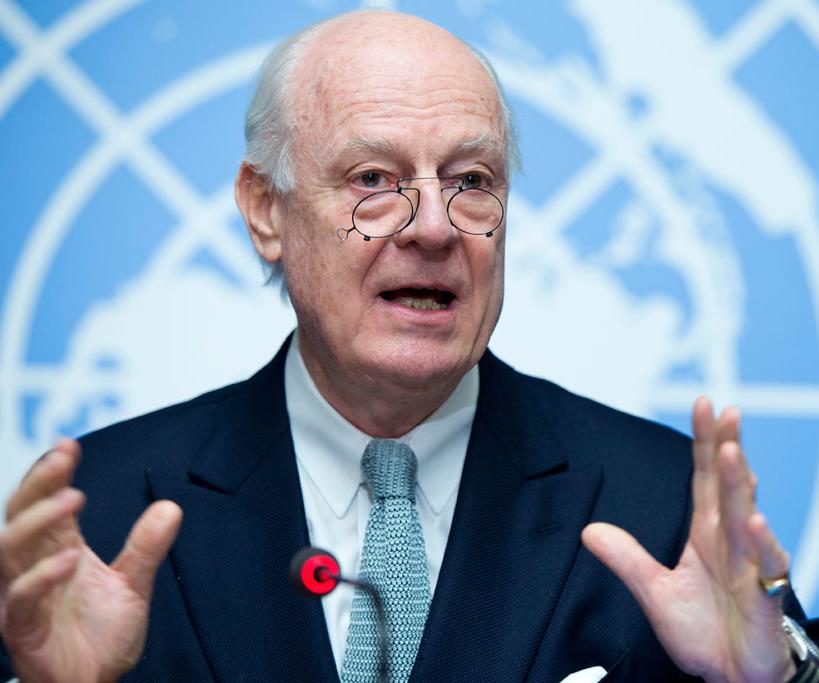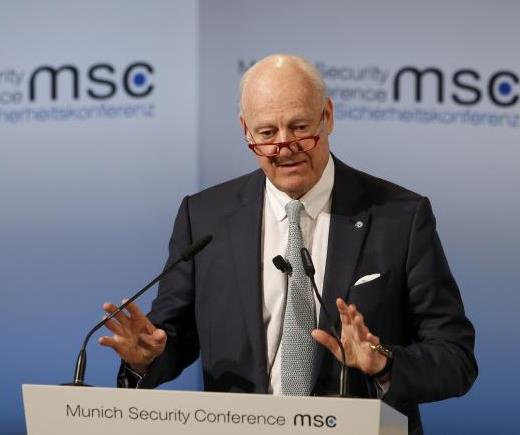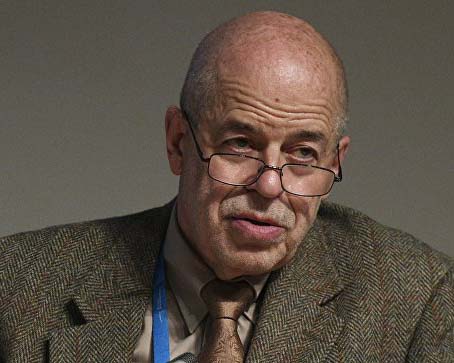Prospects for the upcoming Astana talks on Syria
 The agenda for the next round of Syria talks in the Kazakh capital Astana was determined in an Aug. 7 meeting in Tehran of the three guarantor countries — Turkey, Iran and Russia — amid expectations that the Astana conference will be held in the last week of August. What is expected from this meeting between the Syrian government and opposition representatives?
The agenda for the next round of Syria talks in the Kazakh capital Astana was determined in an Aug. 7 meeting in Tehran of the three guarantor countries — Turkey, Iran and Russia — amid expectations that the Astana conference will be held in the last week of August. What is expected from this meeting between the Syrian government and opposition representatives?
The answers lie in the two de-escalation zones that have been effective so far. The first was announced in early July in the southwest, covering Daraa, Suwaida and Qunaitra. The second was announced on Aug. 2, covering northern Homs, including Al-Waer neighborhood. The expectation is that there will be a push for de-escalation zones in other parts of Syria.
Negotiators will also discuss a proposal shared by UN envoy Staffan de Mistura. It contains the “four baskets” of transitional governance, a constitutional process, elections and counterterrorism. The conference will discuss which topic to handle first; the Syrian government insists on counterterrorism.
The outcome will have a long-term impact on regional stability, particularly in neighboring Jordan, Turkey and Lebanon, which host the largest numbers of Syrian refugees. The meeting could help stop the spill-over from Syria into these countries, provided that Russia and the US continue to cooperate to expand de-escalation zones. The Astana meeting will also call on all countries not to interfere in Syrian internal affairs and focus on how to rebuild the country.
Previous Astana meetings have successfully bridged some gaps between the Syrian government and the opposition. Let us hope that the upcoming one will do the same.
Despite the failure of previous Geneva talks to stop fighting in various parts of Syria, the government and opposition have agreed 15 evacuation deals that have allowed opposition fighters to safely leave besieged cities and towns for Idlib.
A cease-fire in three southwestern governorates was announced on July 10 shortly after long meetings between Russians and Americans in Jordan, which helped bridge the gap between them. Under the deal, Russian officers are monitoring the cease-fire.
To many analysts, things are moving faster than expected in Syria due to coordination between both superpowers, and a belief among the government and opposition that there has been more than enough fighting. Both parties acknowledge that now is the time to stop the war and open a new page for all Syrians to rebuild their country.
Some opposition leaders have started echoing the government in saying a solution cannot be imposed on Syrians by other countries, particularly since the US said it will no longer push for Bashar Assad to be removed from power. Previous Astana meetings have successfully bridged some gaps between the Syrian government and the opposition. Let us hope that the upcoming one will do the same.
Article published in Arab News: http://www.arabnews.com/node/1142776/columns
Photo credit: UN Photo/Jean-Marc Ferré
Geneva IV: Paving the path to peace
 There is no longer unhealthy interest and agitation around the Geneva talks. Speculation and media manipulation have significantly decreased, enabling negotiators to concentrate more on negotiations than on popping cameras. No one expects a breakthrough from Geneva IV, but then it depends what is considered a breakthrough.
There is no longer unhealthy interest and agitation around the Geneva talks. Speculation and media manipulation have significantly decreased, enabling negotiators to concentrate more on negotiations than on popping cameras. No one expects a breakthrough from Geneva IV, but then it depends what is considered a breakthrough.
It is significant that for the first time in almost six years of bloody and devastating war, the government and inclusive opposition are ready for direct talks. Even though UN envoy Staffan de Mistura says he sees little common ground between the sides, the fact that they have matured to the point of overcoming mutual hatred and talking directly is promising.
Another positive sign is that thanks to the efforts of many players — including Russia, Turkey and Saudi Arabia — the opposition has reached the fourth round of talks more united than ever, and able to articulate its positions and demands without stalling each time due to internecine debates and disputes. Despite having little common ground, the sides seem keener on ending the war, concentrating on a political transition and fighting extremists.
Even Turkey, which had staunchly supported the opposition forces from the start of the conflict, has softened its position on the Syrian regime, admitting it is no longer realistic to insist on a solution that excludes President Bashar Assad. The fact that tough preconditions from the opposition side have disappeared from their political statements is also an important and promising sign. Removing a military solution to the conflict is a true breakthrough.
Much was done to make these achievements possible by Turkey and Russia after their own reconciliation. The Astana format, which served to back up the Geneva process, harmonized negotiations and enabled the possibility of direct talks.
The main problem is the ground forces that are not interested in a settlement of the conflict. These radicals and extremists are profiting from it. Jabhat Fateh Al-Sham, formerly Al-Nusra Front, is a major headache. Its infiltration of opposition ranks hampered Russia-US talks on the separation of radical groups and moderate opposition in east Aleppo. This paralysis led to rebel defeat in east Aleppo, which was a game changer in the conflict, at a high cost in human lives that could have been avoided.
Peace in Syria is not in the interests of extremist groups. For Daesh and other terrorists, the longer the conflict, the easier it is to radicalize and recruit. These groups could not survive in peacetime.
At the Munich Security Conference, De Mistura outlined the challenges the political process is facing, and provocations from parties that are playing spoiler. Players such as Russia and Turkey, which stand out as guarantors of the peace process, are working to elaborate mechanisms to minimize the impact of provocations and maintain the cease-fire, which is indispensable for any political process.
It is high time for Syrians to come up with a political settlement to end the violence, chemical attacks, atrocities and suffering. It is high time for the international community to join forces to help them do so.
Geneva IV will not result in breakthroughs that will immediately lead to a political process, but it could pave the way for such agreements. The political maturity of both sides gives hope for further involvement of civil society in negotiations, which will facilitate talks and an indispensable political transition.
International players should stop playing geopolitical games on the bones of innocent Syrians. The longer a political settlement is questioned by negotiating sides, and the longer the Assad regime listens more to Tehran than to Moscow, the stronger terrorist cells will become, and the harder it will be for the international community to fight them. The future of Syria and the world is at stake.
However, the start of a political process is no guarantee of peace. The devil is in the details, and disputes over many issues can lead to the continuation of the conflict in different forms. But no matter the risks and challenges, it is time for all Syrians to work together and remember that they are one nation, and that the key to peace lies only in their hands.
Article published in Arab News:
http://www.arabnews.com/node/1059851
New Syria peace talks go-between is a fixer trusted by the Kremlin
 IMESClub's Council Chairman, one of the greatest world experts on the Middle East was named this week as a mediator in the Syrian peace talks and advisor to Staffan de Mistura.
IMESClub's Council Chairman, one of the greatest world experts on the Middle East was named this week as a mediator in the Syrian peace talks and advisor to Staffan de Mistura.
We share the article by Reuters on the matter.
A Russian academic named this week as a mediator in the Syrian peace talks is an acclaimed expert on the Arab world with the trust of the Kremlin, a sign of the influence Moscow has won at the negotiating table after a five-month military campaign.
Staffan de Mistura, the United Nations envoy on Syria, said he had appointed Russia's Vitaly Naumkin, 70, as a new consultant to support him in brokering peace talks in Geneva between the sides in Syria's civil war. De Mistura said he also wants to appoint an American, who has yet to be named.
The posts reflect the roles of the Cold War-era superpowers as co-sponsors of peace talks that began this week in Geneva, with Moscow a leading supporter of President Bashar al-Assad and Washington friendly with many of his enemies.
Naumkin's position is likely to ensure that Moscow retains its clout at peace talks, even as President Vladimir Putin has announced he is pulling out most of his forces after an intervention that tipped the balance of power Assad's way.
Reuters spoke to nine people who know Naumkin, and all described a talented and well-connected scholar who speaks fluent Arabic and has rich experience mediating in conflicts.
He has close working relationships with Russia's leaders, and describes himself as a protege of Yevgeny Primakov, a former Russian spy chief, foreign minister and prime minister who once served as an architect of Soviet policy in the Middle East and later as an informal mentor to President Vladimir Putin.
Naumkin did not reply to a Reuters request for an interview, but acquaintances said his views were likely to reflect Russia's policies.
"He has a political line, it's our good political line," said Alexei Malashenko, a long-standing Naumkin acquaintance and scholar in residence at the Moscow Carnegie Center think tank.
TIES TO OFFICIALS
Another person who knows Naumkin, who gave an assessment of his role on condition of anonymity, described him as a talented academic who would defer to senior Russian officials on policy.
Several of the people who spoke to Reuters said Naumkin was in regular contact with Mikhail Bogdanov, Russia's deputy foreign minister and presidential Middle East envoy.
De Mistura nevertheless said Naumkin's job would be to help the U.N. mediation team, not serve Russian interests: "He reports to me, not to his own mother country."
Born in the Ural Mountains, Naumkin studied Arabic language and history at Moscow State University, before serving for two years in the Soviet army teaching Arabic to military interpreters.
He gained a reputation as an outstanding simultaneous interpreter and was called on to translate at high-level meetings between Soviet officials and Arab leaders. It was in this role that he built up a rapport with Primakov, whom he met in Cairo in the 1960s.
Primakov later invited him to work as an academic at the Institute of Oriental Studies in Moscow, according to Naumkin's own account. Naumkin did pioneering research into Socotra, an island between Yemen and Somalia, and spent periods living in Yemen and Egypt.
"He knows the Middle East not by hearsay, not from inside an office, but he's lived within it," said Alexander Knyazev, a Kazakhstan-based analyst who has known Naumkin for years.
In the early 1990s, Naumkin facilitated back-channel negotiations between rival sides in a civil war in the mainly Muslim ex-Soviet state of Tajikistan.
Naumkin arrived in the Tajik capital at the height of the fighting together with Harold Saunders, a former U.S. Assistant Secretary of State. Unsolicited, they offered their services as mediators to the Tajik leader.
When he accepted, they went to the Tajik foreign minister's house and slaughtered a sheep to celebrate, according to Kamoludin Abdullaev, a Tajik researcher who was present.
Naumkin's role in the talks was to make sure the opposition's views were heard.
"He was very assertive. The ... negotiations ended successfully," said Mars Sariyev, a former Kyrgyz diplomat who took part on the talks.
SYRIA MEDIATION
Naumkin has already played a back-room role in Syria negotiations, coordinating two rounds of talks in Moscow, backed by the Russian foreign ministry, to try to unite some of Syria's disparate opposition.
Those talks produced no major breakthrough, though not through any fault of Naumkin's, according to Nikolai Sukhov, an Arabist scholar and former student of Naumkin.
People who know Naumkin said he would be unflagging in his efforts to broker a solution in Geneva, would be on good terms with both sides and would not let emotion or frustration get in the way, even if the talks falter.
Western diplomats say it may be useful to have Naumkin in the room at the talks. One said it would encourage the Syrian government delegation to stay at the table despite its reluctance to sit down with its opponents.
Another said it could also be reassuring to the opposition, since the Kremlin has leverage over Damascus: “If the hypothesis is that the Russians will be putting pressure on the regime, maybe it is good to have this guy there.”
(Additional reporting by Olga Dzubenko in BISHKEK, Jack Stubbs and Dmitry Solovyov in MOSCOW, Olzhas Auyezov in ALMATY and Tom Miles and Suleiman Al-Khalidi in GENEVA; writing by Christian Lowe; editing by Peter Graff)











